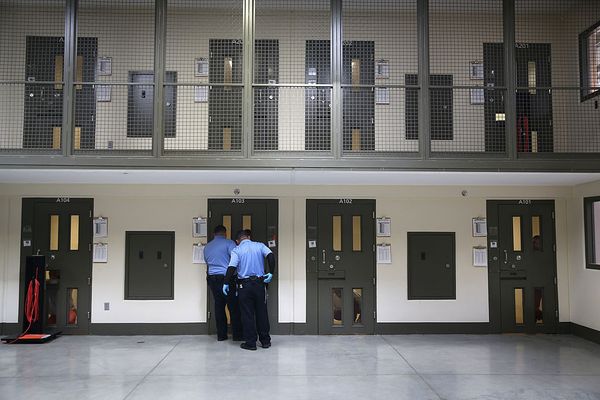
A federal judge in Miami was hearing arguments on Monday that detainees at the remote immigration jail in the Florida Everglades known as “Alligator Alcatraz” are routinely subjected to human rights abuses and denied due process before being deported.
The lawsuit, filed by the American Civil Liberties Union (ACLU), is one of two separate actions before the courts that could lead to the closure of the controversial facility celebrated by Donald Trump for its harsh conditions.
District court judge Kathleen Williams is expected to rule this week in the other case, brought by an alliance of environmental groups and a Native American tribe, claiming that the immigration jail has inflicted irreversible damage to the fragile wetlands.
Earlier this month, Williams issued a temporary restraining order against the state of Florida halting new construction and expansion of the tented camp, although its operations for the Immigration and Customs Enforcement agency (Ice) were allowed to continue.
The jail currently holds an estimated 700 detainees.
Monday’s hearing, before district court judge Rodolfo Ruiz in the same downtown Miami courthouse, was focused on alleged breaches of immigrants’ rights during their detention.
Eunice Cho, an attorney for the ACLU, told reporters at a pre-hearing press conference on Thursday that the situation at “Alligator Alcatraz” was “anomalous from what is typically granted at other immigration facilities”.
She expanded on the allegation during an interview on Sunday with the Miami news channel Local 10, claiming the government was “running roughshod” over detainees’ constitutionally mandated protections.
“We are hearing stories of officers who are going around the facility pressuring people to sign voluntary removal orders without being able to speak to counsel,” Cho said.
“We heard a case of an intellectually disabled man being presented with a paper … he was told that he should sign the paper to get a blanket, and it turned out to be a voluntary departure form. And he was deported very soon after.”
Cho also challenged assertions by Florida’s Republican governor, Ron DeSantis, and the state’s department of emergency management (DEM) that operates the facility for Ice, that all the detainees held there had broken the law, and had either criminal records or active criminal proceedings against them.
“What is very clear is that the people who are being held at Alligator Alcatraz are far from the picture of what the government has been trying to paint them as,” she said.
“There are people who have no criminal history whatsoever, people who have been living in the United States and Florida for decades, have had the same job for over 20 years, have five children and families here.”
She said the ACLU had spoken with attorneys for some of the detainees who submitted sworn testimony to the court alleging the abuses. They include immigrants being held in cages in extreme heat, swarms of mosquitoes, backed up or non-functioning toilets, and temperamental air conditioning units that leave temperatures alternately freezing or sweltering.
An attorney for one detainee said last week he believed a respiratory virus, possibly Covid-19, was “running rampant” through the facility. The Florida DEM has not responded to several requests by the Guardian for comment.
The ACLU is asking Ruiz to order closure of the jail, which was hastily constructed on a disused airstrip with disaster relief funds and opened early in July. Democrats who toured the facility decried what they said were inhumane conditions inside, and cited cases where non-criminals and even a US citizen child was taken there.
Lawyers for the defendants, the justice department and the state of Florida, have argued that the Miami court has no jurisdiction over the camp because it is located in neighboring Collier county, and the case should be held in Florida’s middle district instead.
Ruiz has indicated he will rule on a venue after Monday’s hearing, and indicated at a pre-trial hearing last week that he believed at least some of the arguments might pertain to the adjacent district.
DeSantis announced on Thursday that the state was beginning construction on a new federal immigration jail for an additional 1,300 detainees at the closed Baker correctional institute in northern Florida. The governor nicknamed that facility “the deportation depot”.
Protests outside Alligator Alcatraz, meanwhile, continue to grow. Noelle Damico, director of social justice at the Workers Circle, said almost 300 people attended a rally on Sunday afternoon, and that protests would continue every weekend until the camp was closed permanently.
The best public interest journalism relies on first-hand accounts from people in the know.
If you have something to share on this subject you can contact us confidentially using the following methods.
Secure Messaging in the Guardian app
The Guardian app has a tool to send tips about stories. Messages are end to end encrypted and concealed within the routine activity that every Guardian mobile app performs. This prevents an observer from knowing that you are communicating with us at all, let alone what is being said.
If you don't already have the Guardian app, download it (iOS/Android) and go to the menu. Select ‘Secure Messaging’.
SecureDrop, instant messengers, email, telephone and post
If you can safely use the tor network without being observed or monitored you can send messages and documents to the Guardian via our SecureDrop platform.
Finally, our guide at theguardian.com/tips lists several ways to contact us securely, and discusses the pros and cons of each.







